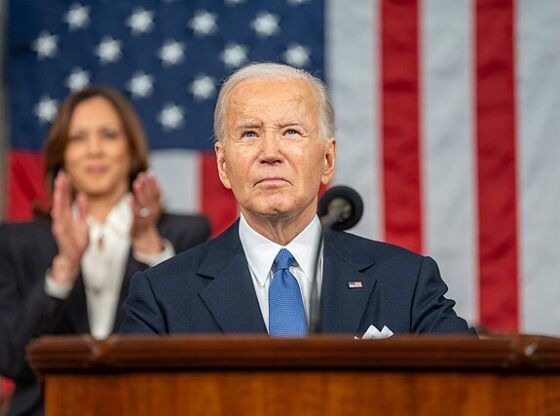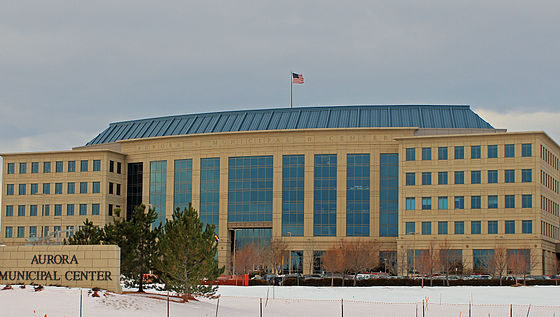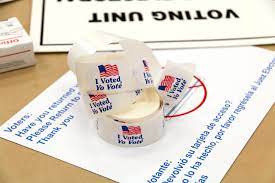Amendment 67
Amendment 67 specifies that “the terms ‘person’ and ‘child’ in the Colorado Criminal Code and the wrongful death statutes include unborn human beings,” according to the Colorado Legislative Council Staff, the nonpartisan research arm of the Colorado General Assembly that, according to its website, “serves under the direction of a Director of Research appointed by an 18-member legislative committee.”

As it is worded, the measure provides no definition of an “unborn human being.” According to the 2014 State Ballot Information Booklet, otherwise known as the “Blue Book,” “Depending on how the term ‘unborn human being’ is defined or interpreted, the measure may impact the availability of abortions under Colorado law,” in addition to the availability “of other medical procedures, devices, and medications, such as certain forms of birth control or vito fertilization.”
Additionally, the amendment could charge those who “intentionally, knowingly, or recklessly cause an unlawful termination of a pregnancy” with homicide, according to the amendment’s “Analysis” section in the Blue Book.
It is reported in the Council’s Fiscal Impact Statement that the amendment would have no fiscal impact if it did pass, due to the fact that “the measure does not require any state actions or services to be provided, nor does it impose any new fines or criminal charges.”
Currently enrolled in a class on population and demography, Mackenzie Boli, senior environmental science major from Topanga, California, feels strongly about the issue as it relates to DU students.
“I am opposed to Amendment 67, because I believe in separation of church and state,” said Boli. “Women are most likely to seek abortion services in their 20s after a primary method of birth control has failed.”
Boli believes the amendment impacts the DU community at large.
“In order to be successful in school we need to have access to control over our bodies, including sexual/reproductive health,” she said.
It is still unclear as to how the passing of this amendment would affect the DU Health and Counseling Center (HCC), whose services currently include birth control and pregnancy counseling, in addition to emergency contraception.
Area Political Director and DU campus recruiter for the Cory Gardner campaign, sophomore finance and marketing double-major Jake Orsborn from Thornton, Colorado, also believes the amendment’s passing could have a definite effect on DU students, though he does not think the amendment will pass, due to what he feels to be an overwhelming amount of people who are pro-choice.
“I don’t know how many girls are getting abortions here, but I’m sure it’s happening,” he said. “I think it could have an effect [on students], in terms of there being more pregnancies or accidental pregnancies, or maybe it would push students to practice safe sex more, because they don’t have a backup plan.”
Amendment 68
Currently, gambling is only legal in Colorado on Indian reservations and in three voter-designated areas: Cripple Creek (near Colorado Springs), Blackhawk and Central City. The Legislative Council of the Colorado General Assembly refers to Amendment 68 in the 2014 State Ballot Information Booklet as an amendment that will “permit casino gambling at horse racetracks in Arapahoe, Mesa, and Pueblo counties, limited to one racetrack in each county; and distribute new casino gambling tax revenue to K-12 public schools.” Through Amendment 68, gambling would be allowed in Arapahoe, Mesa, and Pueblo counties.

This amendment focuses on raising money for K-12 public schools through gambling taxes. According to the Legislative council, “because of its [Arapahoe Park, Aurora, Colorado] location in the Denver metropolitan area, a new casino at Arapahoe Park could provide up to $114.5 million each year for public schools, or about $132 per student beginning in the budget year 2016-2017.” Since the casino in Aurora could open as early as next year, public schools could start to see an increase in their funds fairly soon. Pueblo and Mesa counties would not be able to open a casino for at least three more years.
Many opponents believe there is some uncertainty in the amendment itself. This amendment is being backed by a Rhode Island company, which could see some of the benefits of the amendment. Another issue for opponents is that the gambling towns in Colorado could lose a significant portion of their current business; this would be detrimental to those towns because they rely heavily on tourist revenue to remain in business.
Even though Amendment 68 only affects K-12 public schools, DU students still have strong opinions on this amendment.
Heather Stallman, a DU graduate student studying forensic psychology, says, “Gambling imposes a problem and whether or not you want to reinforce it, that’s okay, but at the same time not everyone has a problem with it, so why not capitalize on the practice for that.” She continues, “As long as [money from gambling tax] goes to a good cause, I’m okay with it.”
Proposition 104
The Colorado Legislative Council Staff defines Proposition 104 as follows: “[Proposition 104] requires that local school boards or their representatives negotiate collective bargaining agreements in open meetings.” The proposition itself is general, making the conditions in which an open meeting must be held vague.

According to Council staff, “Under this measure, school boards or their representatives are required to negotiate collective bargaining agreements in meetings that are open to the public. It is unclear whether the measure requires school boards to discuss their negotiation strategies in public.”
While it seems Proposition 104’s main purpose is to propose open school board meetings, it could also be serving an alternative agenda because the verbiage of the proposition is so vague.
Proposition 104 is anticipated to have no effect on the state’s funds.
According to the Council staff, “requiring school boards to modify negotiation practices related to collective bargaining agreements may increase local school districts’ administrative workloads. The proposition applies to school districts and will not affect state spending or revenue.”
DU will most likely not be impacted by Proposition 104, as the measure only pertains to the school boards within school districts. Even though DU may not be directly impacted, some Pioneers still feel strongly about the proposition.
The Independence Institute, who created Proposition 104, approach the issue with transparency in mind: they believe that school boards should be transparent and open. Many feel this is counterintuitive because this group is viewed as a “conservative think tank.” Opposing groups, like the Colorado Educators Association, feel that this initiative could have some negativity behind it because it is being spearheaded by a libertarian group.
Andrew Scott, a DU graduate student studying global finance at the Korbel School of International Studies said, “From a transparency perspective, it [open school board meetings] is effective. I would imagine the crowd would only be people that have invested interest into the school, but it’s valuable to let the community in on how the school board works.” He continues, “[Overall] I feel from it is valuable, but from an enacting policy perspective it is ineffective and inefficient.”
Proposition 105
This measure deals with the labeling of genetically modified food, otherwise known as genetically modified organisms, or GMOs. According to the Colorado Legislative Council Staff, “Genetic engineering refers to the process of scientifically altering organisms at the molecular or cellular level.”

In their Fiscal Impact Statement, the Council staff reported GMOs having been in the U.S. food supply since 1990, with the U.S. Department of Agriculture (USDA) reporting in 2013 that 90 percent of corn, 90 percent of cotton and 93 percent of soybean crops planted in the U.S. were genetically engineered.
According to the Council staff, “Proposition 105 amends the Colorado statutes to require that certain foods that have been produced with genetic engineering or that have been genetically modified be labeled with the words ‘Produced with Genetic Engineering.’”
While the U.S. Food and Drug Administration (FDA) currently allows food producers “to voluntarily label products as to whether or not they contain genetically engineered material,” the passing of this proposition would require it. This would impact local governments “by creating a new element to the misdemeanor crime of mislabeling a food, drug, device, or cosmetic product.” While the precise impact cannot yet be determined, due to the courts having discretion of incarceration, imposing a fine, or both, the statement confirms that the impact on county jails is expected to be minimal.
Though certain foods and food products are exempted from the measure’s requirements, if the proposition passed, any genetically engineered or genetically modified food not labeled as required by the measure aside from those that are exempt would be considered misbranded beginning July 1, 2016.
The Staff’s Fiscal Impact Statement also states that the proposition will affect state and local government spending, in addition to state revenue, noting how, if the proposition passes, state revenue is expected to increase “from fines imposed on any manufacturers, distributors, or retailers that violate the Colorado Food and Drug Act by failing to properly label foods produced with genetic engineering.” Though the measure is not expected to affect state spending in the 2014-15 fiscal year, it is expected to increase state General Fund expenditures in the Colorado Department of Public Health and Environment (CDPHE) by $112,640 in the 2015-16 fiscal year, and by $129,319 for the 2016-17 fiscal year, assuming labeling requirements will be put in place by July 1, 2016.
Sophomore international studies and Spanish double-major Mark McCarthy from Golden, Colo., who also serves as Off-Campus Senator for the University Student Government and Co-Chair of the DU Sustainability Committee, believes there are some misconceptions about GMOs in relation to this proposition.
“I think a lot of people think this is an attack on products using GMOs,” he said, “but honestly, it’s mostly about educating the consumer and educating the Colorado public about what they’re eating.
According to McCarthy, the problem with Proposition 105 is that there are other dietary issues with food that contribute a lot more to health hazards, such as artificial sweeteners, synthetic trans fats, artificial flavors, MSG (Monosodium Glutamate), artificial colors and high fructose corn syrup, to name a few.
“I think the problem with the current perception of GMOs is that people assume they have massive health risks, but in moderation and with education, it doesn’t necessarily have to be the case,” said McCarthy.
While he says he does understand the moral problem of altering nature and changing the gene pool of an organism that some people think companies should not have the ability to do, McCarthy acknowledges the fact that GMOs help production processes in terms of making it a lot easier to produce and distribute reliable foods.
Though he says he doesn’t sway either way on the issue, as he understands the arguments for both sides, McCarthy says that although the proposition would not apply to restaurants, he would want Sodexo dining at DU to follow the regulations proposed by Proposition 105 if it were passed.
“I think it would be an interesting initiative if DU labeled their foods as containing GMOs, not to scare people away from consuming them, but simply to gain awareness and education about what the food we are eating contains,” he said.
Register to Vote
Throughout October, representatives have been posted throughout the DU campus urging those unregistered voters to get registered. For those students unable to fill out the required paperwork on the spot, the Colorado Elections Division and the Colorado Secretary of State have a website where they can register online at a more convenient time. All one needs to register online is a Colorado Drivers License or state-issued ID. The last day to register to vote in Colorado is Monday, Nov. 3, which is the day before the all-mail election.
To register online, go to: https://www.sos.state.co.us/voter-classic/secuRegVoterIntro.do.
Be sure to drop ballots off or mail them in before election day.
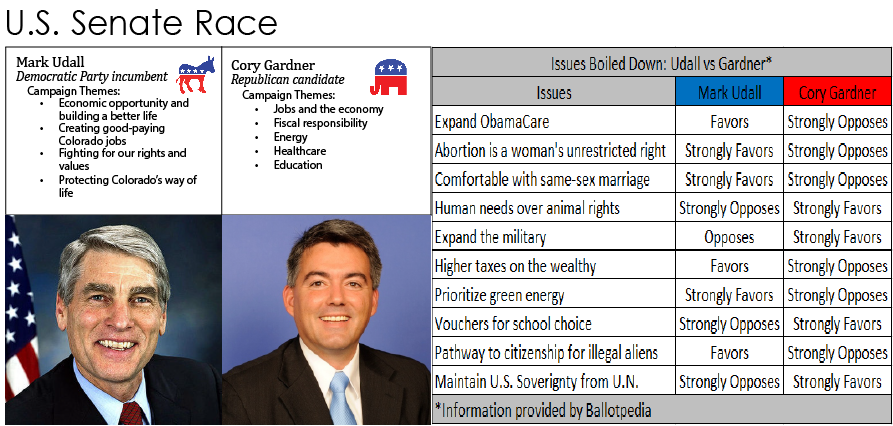
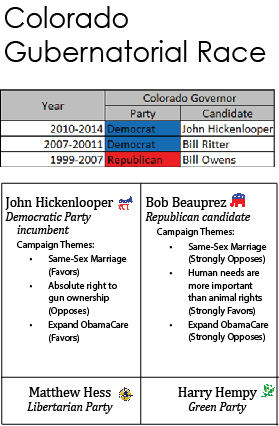
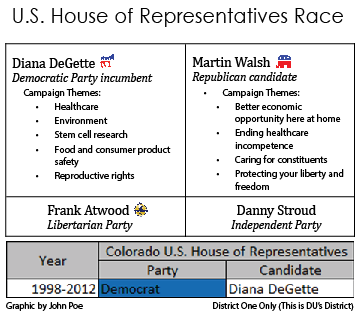
Vote!
Alongside Oregon and Washington, Colorado participates in mail-in ballots for elections.
If students register to vote by Oct. 27, a ballot will be mailed to them. Anyone registering after that date must visit a polling center on Election Day to vote.
Voters can either send mail-in ballots back to the County Clerk and Recorder or drop them off at a ballot drop off location.
The nearest ballot drop off location is the Denver Police Department District 3, 1625 S. University Blvd. The nearest polling center, where voters can vote in-person and drop off their ballot, is located at: Harvard Gulch Recreation Center, 550 E. Iliff Ave.

***For more information on the candidates, visit their respective websites:
U.S Senate:
– Mark Udall (Democratic Party)
– Cory Gardner (Republican Party)
– Gaylon Kent (Libertarian Party)
House of Representatives:
– Diana DeGette (Democratic Party)
– Martin Walsh (Republican Party)
– Frank Atwood (Libertarian Party)
– Danny Stroud (Independent Party)
Colorado Governor:
– John Hickenlooper (Democratic Party)
– Bob Beauprez (Republican Party)
– Matthew Hess (Independent Party)
– Harry Hempy (Green Party)








